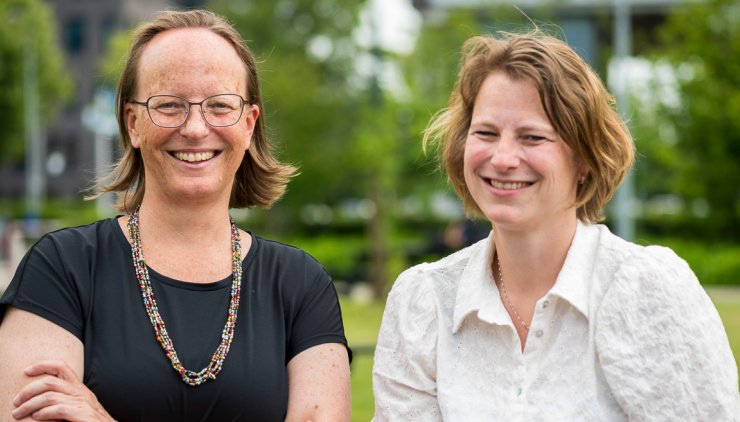-
16 juni
-
Talentgericht
-
Inclusive
Fontys and TU/e provide coaching to students up to one year after obtaining their diploma

[Also read the story of Dana Martens below. She found a suitable job with the help of job coaching]
'Some students struggle to find a graduation position, an internship, or a job. The causes vary from mental health issues and stress to heavy caregiving responsibilities, autism, or ADHD. Not every student's studies proceed smoothly, especially not since the COVID-19 pandemic,' says Manon Krabbenborg, project leader of Career Jumpstart.
'Sometimes, students require additional support to prevent them from dropping out during their internship or graduation. That's why forty teachers from various institutes at Fontys have been trained as job coaches. They help students discover and make use of their talents and have learned how during their internship and graduation, as well as help them find a suitable work environment."
Bachelor's degree holder becomes mail carrier
The phenomenon of job coaching proved to meet a need. Job coaches expressed being pleased with the skills they had learned and could apply in their coaching practice. However, something bothered Manon. 'We guide students until they obtain their diploma. After that, they are on their own. And we know that not every student finds a job or a job at their level. Some end up working as mail carriers or salespeople in hardware stores. You don't need a bachelor's degree for those positions, do you?'
So where does it go wrong? Manon: 'Sometimes, students feel extremely anxious about applying for jobs. They don't know how to do it, they may be too honest or humble and hesitate to apply. Or they find it too nerve-wracking. Or they run into issues when they just started their first job. In short, not everyone has fully developed employment skills, and not every organisation looks at a candidate's talents. In other words: the transition to the labour market is too big. And because we don't educate students to be unemployed, we had to take it up a notch.'

The solution was obvious - and then again not: counselling students after they have already completed their studies. Manon: 'Together with my colleague Marlou Heskes, I then started Career Jumpstart, a career centre for students with a support need. We guide (almost) graduated students with a support need in finding a suitable graduation and/or workplace. By now, both Fontys and TU students can make use of this facility.'
Scary on your own
Sonja Voorn, in addition to being an internship and graduation coordinator at the Engineering Physics programme at Fontys, is also trained as a job coach. She recognises the picture Manon paints. 'I know how exciting some students find it to go on an internship. The step from havo (Dutch secondary education) to our programme is not that big. Classes of 32 students, practicals in groups of 16, and projects in groups of 8: that's all nice and clear and familiar. But when you start an internship, you are suddenly on your own. Of course, students receive guidance from the internship company and from Fontys, but in projects at school, you do the work with other students. During the internship, you do everything by yourself. Students find that scary, which is quite understandable.'
For all Fontys institutes
Together with several colleagues from three Eindhoven-based technical institutes, Sonja followed an on-the-job training programme to become a job coach. 'We support students in their search and successful completion of an internship, for example by helping them write a CV or discussing difficult situations the student may encounter. These are students with support needs, for example due to psychological problems, trauma, ADHD, or autism. Without this support, it is questionable whether these students would have completed their degrees. Because the course was a success, an official Fontys job coach course is now available to all Fontys institutes (see below).'
Manon summarises: 'Along three tracks, Fontys guides students who need support towards suitable internships, graduation, and workplaces. Firstly, through specific subjects in the curriculum such as career orientation, projects for companies, and job application training. However, the availability of these does depend on the programme you follow. In addition, job coaching is available for students with a support need who get stuck in their search for a suitable internship or graduation placement. Finally, up to a year after graduation, guidance is available through Career Jumpstart'.
Flourishing in a suitable job
The trained job coaches work together with Career Jumpstart, says Manon. 'Because of this cooperation, the guidance takes place as much as possible within the student's institute. The guidance from Career Jumpstart is free of charge for the student; Fontys covers a large part of the costs, in cooperation with the TU/e, the municipality, and the ASML foundation. This fits in with themes Fontys stands for, such as inclusiveness and talent development. By taking individual talents as a starting point and not as limitations, we increase equal chances for everyone when it comes to finding a suitable job in which Fontys graduates can flourish. And the more diversity in an organisation, the more creativity, innovation, and ultimately the more return it generates. That's good for students and for society.'
